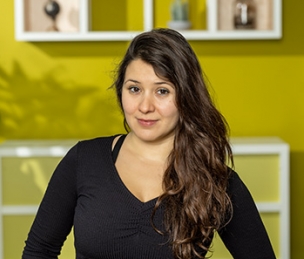Displaying 1 - 15 of 15
-
Cambier, N., Miletitch, R., Benítez-Burraco, A., & Raviv, L. (2022). Prosociality in swarm robotics: A model to study self-domestication and language evolution. Talk presented at the Joint Conference on Language Evolution (JCoLE). Kanazawa, Japan. 2022-09-05 - 2022-09-08.
-
Galke, L., Ram, Y., & Raviv, L. (2022). Emergent communication for understanding human language evolution: What's missing?. Talk presented at the Tenth International Conference on Learning Representations (ICLR 2022). online. 2022-04-25 - 2022-04-29.
-
Galke, L., Ram, Y., & Raviv, L. (2022). Emergent communication for understanding human language evolution: What's missing?. Poster presented at the IMPRS Conference 2022, Nijmegen, The Netherlands.
-
Lammertink, I., Verhagen, J., Rispens, J., & Raviv, L. (2022). Learnability effects in children: Are languages with more systematic structure easier to learn?. Poster presented at the 4th International Conference on Interdisciplinary Advances in Statistical Learning, San Sebastian, Spain.
-
Raviv, L., Jacobson, S. L., Plotnik, J. M., Bowman, J., Lynch, V., & Benítez-Burraco, A. (2022). Elephants as a new animal model for studying the evolution of language as a result of self-domestication. Talk presented at the Joint Conference on Language Evolution (JCoLE). Kanazawa, Japan. 2022-09-05 - 2022-09-08.
-
Raviv, L. (2022). Linking language evolution, language learning and language diversity [keynote]. Talk presented at the Joint Conference on Language Evolution (JCoLE). Kanazawa, Japan. 2022-09-05 - 2022-09-08.
-
Raviv, L., Meyer, A. S., & Lev-Ari, S. (2018). Network structure and the cultural evolution of linguistic structure: An artificial language study. Talk presented at the Cultural Evolution Society Conference (CES 2018). Tempe, AZ, USA. 2018-10-22 - 2018-10-24.
-
Raviv, L., & Arnon, I. (2018). The developmental trajectory of children’s auditory and visual statistical learning abilities: Modality-based differences in the effect of age. Poster presented at the Nijmegen Lectures 2018, Nijmegen, The Netherlands.
-
Raviv, L., Meyer, A. S., & Lev-Ari, S. (2018). Social structure affects the emergence of linguistic structure: Experimental evidence. Talk presented at the Linguistics Department Colloquium Series. University of Arizona, Tuscon, AZ, USA. 2018-10-26.
-
Raviv, L., Meyer, A. S., & Lev-Ari, S. (2018). Social structure affects the emergence of linguistic structure: Experimental evidence. Talk presented at the Language evolution seminar, Center for Language evolution, University of Edinburgh. Edinburgh, UK. 2018-08-21.
-
Raviv, L., Meyer, A. S., & Lev-Ari, S. (2018). Social structure affects the emergence of linguistic structure: Experimental evidence. Talk presented at the Cohn Institute for the History and Philosophy of Science, Tel Aviv University. Tel Aviv, Israel. 2018-12-23.
-
Raviv, L., Meyer, A. S., & Lev-Ari, S. (2018). Social structure affects the emergence of linguistic structure: Experimental evidence. Talk presented at the Department of Linguistics, Tel Aviv University. Tel Aviv, Israel. 2018-12-25.
-
Raviv, L., Meyer, A. S., & Lev-Ari, S. (2018). Social structure affects the emergence of linguistic structure: Experimental evidence. Talk presented at the Donders Discussions 2018. Nijmegen, The Netherlands. 2018-10-11.
-
Raviv, L., & Lev-Ari, S. (2018). The role of community size and network structure in the emergence of linguistic structure. Talk presented at the Diversity in Language, Culture and Cognition Colloquium Series. Nijmegen, The Netherlands. 2018-05-03.
Abstract
Understanding world-wide patterns of language diversity has long been a goal for philosophers, linguists, and evolutionary scientists. Research over the past decade has suggested that linguistic diversity may result from differences in the physical and social environments in which languages evolve. Specifically, cross-linguistic and historical analyses showed that the structure of languages spoken in exoteric societies is different from the structure of languages spoken in esoteric societies (e.g., Lupyan & Dale, 2010; Meir et al., 2012; Nettle, 2012; Trudgill, 2009; Wray & Grace, 2007). In particular, it has been argued that increased population size, sparser community structure and higher proportion of adult L2 learners in the community lead to morphological simplification. However, these three community properties are typically confounded in the real world, making it hard to evaluate their separate contribution to this pattern of variation. In this talk I will present results from three studies in which we examine the live formation of new languages created in the lab by different micro-societies, which differ in their size or in their network connectivity. This is the first experimental demonstration for the unique and causal role of community size and network structure in the emergence of linguistic structure. -
Raviv, L., Meyer, A. S., & Lev-Ari, S. (2018). The role of community size in the emergence of linguistic structure. Talk presented at the 12th International Conference on the Evolution of Language: (EVOLANG XII). Torun, Poland. 2018-04-15 - 2018-04-19.

Share this page